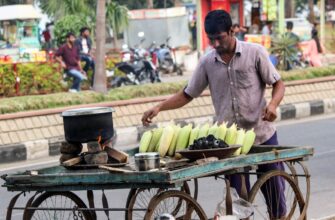- Introduction: Buying Bitcoin with Bkash Made Simple
- Why Use Bkash for Bitcoin Purchases?
- Step-by-Step: How to Buy Bitcoin Using Bkash
- Step 1: Choose a P2P Exchange Platform
- Step 2: Create and Verify Your Account
- Step 3: Navigate to P2P Trading Section
- Step 4: Select a Reputable Seller
- Step 5: Initiate Trade and Pay via Bkash
- Step 6: Receive Bitcoin in Your Wallet
- Critical Safety Measures
- Frequently Asked Questions (FAQ)
- Q1: Is buying Bitcoin with Bkash legal in Bangladesh?
- Q2: What are the transaction limits?
- Q3: How long does the entire process take?
- Q4: What fees should I expect?
- Q5: Can I reverse a Bitcoin transaction?
- Q6: Which wallets support Bkash withdrawals?
- Conclusion: Your Gateway to Crypto
Introduction: Buying Bitcoin with Bkash Made Simple
As Bangladesh’s leading mobile financial service, Bkash has revolutionized digital payments for millions. With Bitcoin’s growing popularity, many users seek ways to purchase cryptocurrency directly through this convenient platform. While Bkash doesn’t offer direct Bitcoin purchases, this guide reveals proven methods to securely convert your Bkash balance into Bitcoin using peer-to-peer (P2P) exchanges. We’ll walk you through each step while highlighting crucial safety precautions.
Why Use Bkash for Bitcoin Purchases?
Bkash offers distinct advantages for crypto buyers in Bangladesh:
- Instant Transactions: Funds transfer in seconds
- Massive Accessibility: Over 70 million users nationwide
- No Bank Requirement: Operates via mobile without traditional banking
- Low Fees: Minimal transaction costs compared to international transfers
Step-by-Step: How to Buy Bitcoin Using Bkash
Step 1: Choose a P2P Exchange Platform
Select exchanges supporting Bkash transactions like Binance P2P or LocalBitcoins. Verify platform security and user reviews before registration.
Step 2: Create and Verify Your Account
- Sign up using your email and phone number
- Complete KYC verification with national ID
- Enable two-factor authentication (2FA)
Step 3: Navigate to P2P Trading Section
Locate the “Buy Crypto” or “P2P Trading” tab. Set filters to:
- Currency: BDT (Bangladeshi Taka)
- Payment Method: Bkash
- Cryptocurrency: Bitcoin (BTC)
Step 4: Select a Reputable Seller
Evaluate sellers based on:
- Completion rate (95%+)
- Trade volume (500+ transactions)
- Positive feedback ratings
- Competitive BTC/BDT rates
Step 5: Initiate Trade and Pay via Bkash
- Enter desired BTC amount (minimum 500 BDT equivalent)
- Confirm transaction details
- Send payment to seller’s Bkash number shown in the trade window
- Upload payment receipt as proof
Step 6: Receive Bitcoin in Your Wallet
Sellers typically release BTC within 15 minutes after payment verification. Funds will appear in your exchange wallet. For added security, transfer to a private wallet like Trust Wallet.
Critical Safety Measures
Protect yourself during P2P transactions:
- ❌ Never share Bkash PIN or exchange passwords
- ✅ Always communicate within the exchange platform
- 🔒 Use escrow services – never pay outside the system
- 📸 Capture full transaction screenshots
- ⚠️ Avoid “too good to be true” offers
Frequently Asked Questions (FAQ)
Q1: Is buying Bitcoin with Bkash legal in Bangladesh?
While Bangladesh Bank prohibits direct crypto transactions, P2P trading operates in a legal gray area. Users assume personal responsibility for compliance with financial regulations.
Q2: What are the transaction limits?
Bkash imposes tiered limits: Basic accounts (৳25,000/day), Full KYC (৳50,000/day). Exchange platforms may set additional purchase minimums.
Q3: How long does the entire process take?
From account setup to BTC receipt: 30-90 minutes for first-time users. Subsequent purchases take under 15 minutes.
Q4: What fees should I expect?
Typical costs include:
– Bkash send money fee: ৳9.5 + 1.85%
– Exchange trading fee: 0%-0.5%
– Blockchain network fee: ৳20-৳150
Q5: Can I reverse a Bitcoin transaction?
No. Crypto transactions are irreversible once confirmed on blockchain. Disputes must be resolved through exchange mediation during the payment window.
Q6: Which wallets support Bkash withdrawals?
You can sell Bitcoin through P2P exchanges and withdraw BDT to Bkash. Popular options include Binance P2P and Paxful.
Conclusion: Your Gateway to Crypto
While requiring careful execution, buying Bitcoin with Bkash opens cryptocurrency access to Bangladesh’s unbanked population. By following this guide and prioritizing security, you can safely navigate P2P platforms. Start with small transactions, verify sellers meticulously, and gradually build your crypto portfolio. As regulations evolve, this convenient payment bridge may pave the way for broader crypto adoption across South Asia.








